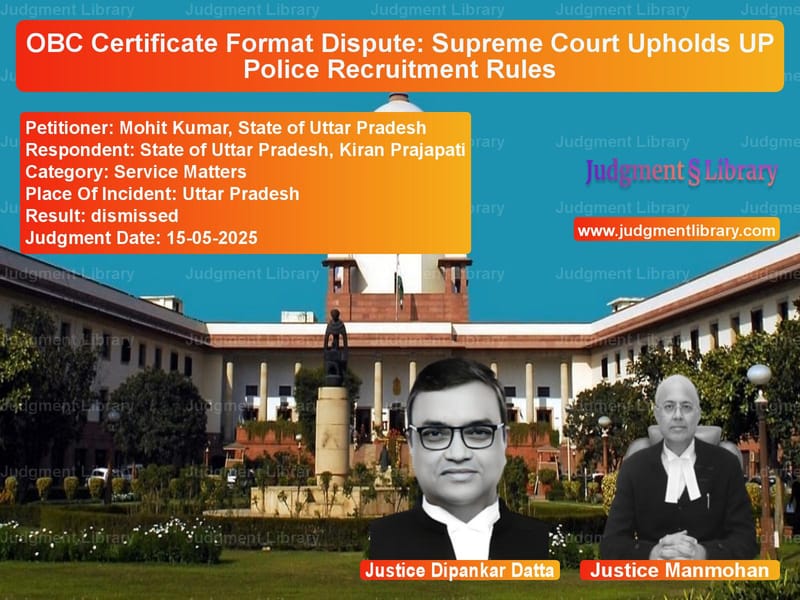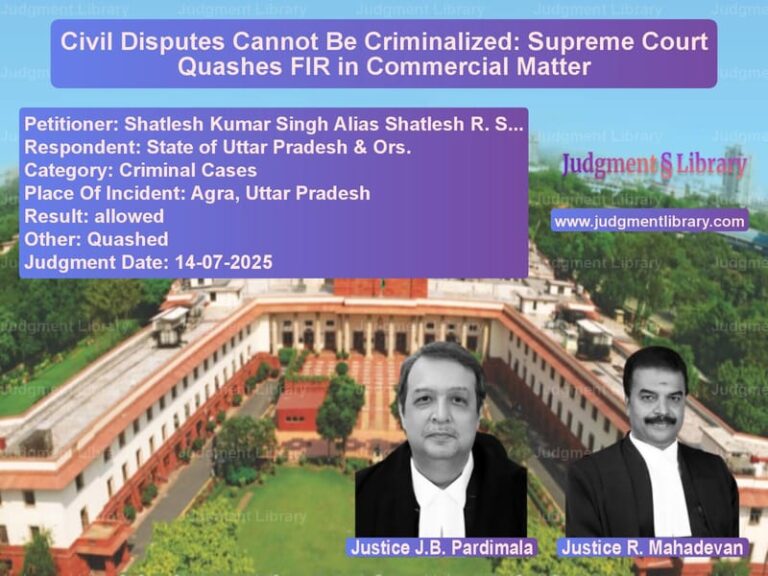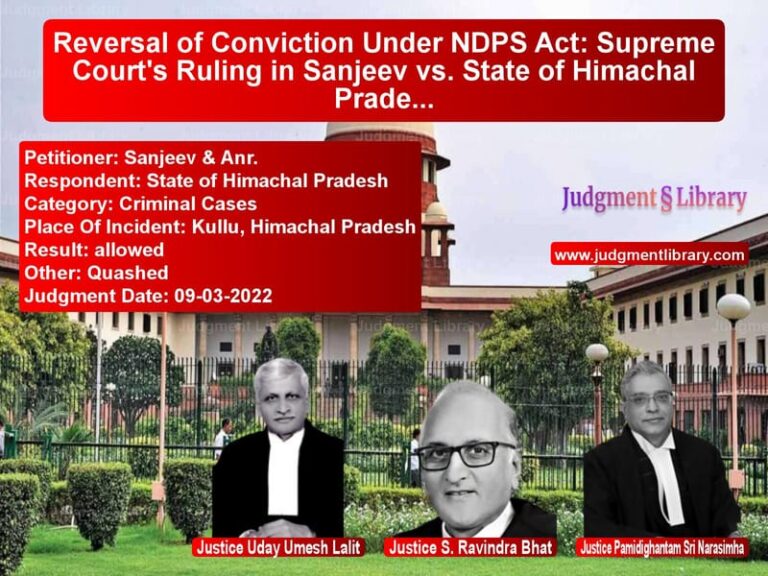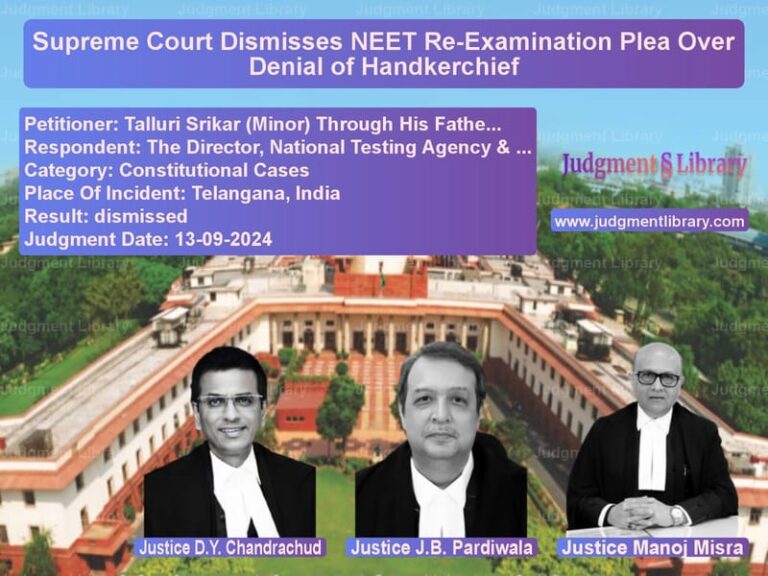OBC Certificate Format Dispute: Supreme Court Upholds UP Police Recruitment Rules
In a significant ruling that clarifies the importance of adhering to recruitment notification requirements, the Supreme Court of India delivered a judgment on May 15, 2025, addressing the contentious issue of OBC certificate formats in police recruitment processes. The case involved two aspiring candidates – Mohit Kumar and Kiran Prajapati – who found their dreams of becoming police officers dashed due to what appeared to be a technicality, but what the court ultimately determined was a fundamental requirement of the recruitment process.
The Uttar Pradesh Police Recruitment and Promotion Board (UPPRPB) had issued a notification on February 24, 2021, for direct recruitment to the posts of Sub-Inspector, Civil Police and Platoon Commander, PAC and Fire Officer for the year 2020-2021. Both Mohit Kumar and Kiran Prajapati applied under the OBC category and performed well in the examinations. Mohit scored 313.84 marks while Kiran secured 287 marks. The cut-off marks for the general category and OBC category were 316.11 and 305.542 respectively for Mohit’s recruitment, and 296.597 and 285.92 for Kiran’s. Both candidates had scored above the OBC cut-off but below the general category cut-off.
The controversy arose when UPPRPB rejected both candidates’ applications because they had submitted OBC certificates in the format prescribed for Central Government appointments rather than the specific ‘Format-I’ required by the State Government recruitment notification. Clause 5.4(4) of the advertisement clearly stated: “If the candidates belonging to other backward class category do not submit the certificate in the prescribed format-I/ within prescribed period or if they submit the certificate of Other Backward Class category valid for the services of Government of India, they will be treated as candidates of unreserved category.”
Mohit Kumar approached the High Court challenging the rejection of his representation, but his writ petition was dismissed on March 22, 2023. In a contrasting outcome, Kiran Prajapati’s writ petition was allowed by a Single Judge on March 27, 2023, directing UPPRPB to accept her OBC certificate. However, this decision was challenged by the State before a Division Bench, which dismissed their appeal on August 25, 2023. These conflicting outcomes led to the Supreme Court appeals being heard together.
The State’s Arguments
Ms. Ruchira Goel, learned counsel appearing for the State and UPPRPB, presented compelling arguments justifying the strict adherence to the certificate format requirement. She emphasized that the recruitment was governed by the Uttar Pradesh Sub-inspector and Inspector (Civic Police) Service (Amended) Rules, 2015, and the Uttar Pradesh Public Services (Reservation for Schedule Castes, Schedule Tribes and Other Backward Classes) Act, 1994.
The State’s counsel pointed out that a Government Order dated December 17, 2014, issued under the 1994 Act, proscribed OBC reservation for persons having gross annual income of Rs. 8 lakh or above or possessing wealth above the exempted limit under the Wealth Tax Act, 1957. She argued that “the object and rationale of the criteria in clause 5.4(4) is to ensure compliance of or ascertainment of creamy layer, which is redefined by the State Government and the Central Government from time to time.”
Ms. Goel explained the practical difficulties if the requirement was relaxed: “In the absence thereof, the State machinery would be burdened with the inquiry of individual candidates who submit a caste certificate for Central Government and would have to ascertain whether they also qualify as OBC-NCL under the rules of the State Government.”
Read also: https://judgmentlibrary.com/pension-rights-for-absorbed-employees-supreme-court-landmark-ruling/
The format prescribed in ‘Format-I’ of the recruitment notification specifically required that the gross annual income of the candidate’s parents for a continuous period of three years is not above Rupees eight lakh and that he/she does not possess wealth above the exemption limit, as prescribed in the Wealth Tax Act 1957. This crucial prescription found no place in the caste certificate prescribed for jobs under the Central Government.
The State also relied on the Full Bench decision of the High Court in Gaurav Sharma v. State of U.P. which held that there is no repugnancy between the financial criteria fixed by the Union and the State Governments for the purpose of identification of creamy layer.
The Candidates’ Plea
Mr. Rahul Kaushik, learned senior counsel appearing for Mohit Kumar, made emotional and substantive appeals for relief. He argued that “OBC certificate for participating in recruitment processes initiated by both the Central Government and the State Government, is issued by the Tehsildar” and therefore the substance should matter over form.
Making a plea against technical rejection, Mr. Kaushik submitted that “Mohit comes from a poor family and his entire hard work would be drained for want of a certificate in a particular format.” He emphasized that Mohit had secured 313.684 marks which exceeded the OBC category cut-off of 305.542 marks, and thus “merit has been overlooked much to his detriment and prejudice.”
The counsel cited several Supreme Court decisions to support his arguments. He referenced Dolly Chhanda v. Chairman, Jee & Ors. to highlight that “every infraction of rule may not necessarily result in rejection of candidature.” He also relied on Dheerender Singh Paliwal v. Union Public Service Commission for the proposition that “in case of any doubt as to qualification of any candidate, the candidate could have been called upon to produce the required certificate.”
Mr. Kaushik further cited Ram Kumar Gijroya v. Delhi Subordinate Services Selections Board and Anr. and Karn Singh Yadav v. Government of NCT of Delhi & Ors. to remind the Court that “the object of providing reservations to members of the Scheduled Caste/Scheduled Tribe communities is to remove inequalities in employment and provide a level playing field for those belonging to educationally and socially backward classes of society; hence, it would be unreasonable to be too technical in one’s approach and throw asunder the object sought to be achieved by reservations.”
Mr. Kumar Gaurav, learned counsel for Kiran Prajapati, adopted the submissions made by Mr. Kaushik.
The Court’s Analysis and Reasoning
The Supreme Court, in its judgment delivered by Justice Dipankar Datta with Justice Manmohan concurring, initiated its discussion by referring to the precedent in Registrar General, Calcutta High Court v. Shrinivas Prasad Shah and Ors. In that case, the Court had held that irrespective of whether an aspirant for public employment belongs to a particular community like SC/ST/OBC, the status claimed by him for being accorded the benefit of reservation is per se not decisive.
The Court reproduced the crucial holding from Shrinivas Prasad Shah: “We find no error in the decision taken by the Commission in not entertaining the respondent’s application as a ST candidate since no certificate was produced from the competent authority, as provided under the West Bengal Scheduled Castes and Scheduled Tribes (Identification) Act, 1994. The information to the candidates specifically stated that the candidates claiming to be SC/ST/BC must have a certificate from a competent authority specified in the West Bengal Scheduled Castes and Scheduled Tribes (Identification) Act, 1994. No such certificate was produced from that competent authority by the respondent. Consequently, in the absence of the requisite certificate, the Commission was justified in treating him as a general category candidate.”
The Court emphasized that “What follows from the above decision is that irrespective of whether an aspirant for public employment belongs to a particular community like SC/ST/OBC, the status claimed by him for being accorded the benefit of reservation is per se not decisive. Such status has to be certified by the competent authority upon following due process and identification that the aspirant is what he claims to be.”
Although the Court noted that in Shrinivas Prasad Shah, the requirement of production of a certificate from the competent authority was held to be mandatory in view of a statutory mandate, while in the present case there was no such statutory mandate, “the requirement in question is no less mandatory and must be scrupulously followed.”
The Court made a significant observation about equality in recruitment processes: “Once a process of recruitment is set in motion, all aspirants are entitled in law to equal treatment. There cannot be different yardsticks for different sets of aspirants. Non-compliance with the terms of the advertisement/notification is bound to trigger adverse consequences of rejection of the aspirant’s claimed status by the selecting body/appointing authority, should he choose not to adhere to the same.”
The Court then examined the specific clause 5.4(4) of the recruitment notification and found it to be absolutely clear in its requirement and consequence. The Court noted that “It clearly warns what the consequence would be should an aspirant fail to submit the requisite certificate in Format–I. Admittedly, the certificates submitted by Mohit and Kiran do not align with Format-I.”
Addressing the broader principles of recruitment jurisprudence, the Court observed: “It is no longer res integra that terms of an advertisement issued in connection with a selection process are normally not open to challenge unless the challenge is founded on the ground of breach of Article 16 of the Constitution or, for that matter, Article 14.”
The Court laid down important guidelines for candidates participating in recruitment processes: “Once an advertisement is issued inviting applications for public employment, it is the responsibility, nay duty, of an aspirant to read and note the terms and understand what its requirements are. If any aspirant finds any of the terms ambiguous and there is scope for an inquiry inbuilt in the advertisement or is provided by any rule/regulation, an effort ought to be first made to obtain clarity for understanding the requirements accurately.”
The Court specifically addressed the situation where candidates participate in a process without raising objections: “if the aspirant does not make any such effort and takes a calculated chance of selection based on his own understanding of the disputed term in the advertisement and later, he emerges unsuccessful, ordinarily, it would not be open to him to challenge the selection on the ground that the disputed term is capable of being understood differently.”
In such cases, the Court emphasized that “the courts should be loath to entertain such plea of ambiguity while preferring to accept the recruiting authority’s understanding of the said term. This is for the simple reason that the recruiting authority is the best judge of what its requirements are and it is such understanding of the recruiting authority that would matter most in cases brought up before the courts.”
The Court rejected the argument that the requirement was a mere formality, noting that “clause 5.4(4) with which we are concerned is far from ambiguous. It is absolutely clear what UPPRPB required and what would be the consequence of non-adherence.”
The Court also found merit in the State’s explanation for insisting on the specific format: “the reason why UPPRPB has insisted for the certificate in the requisite format as explained by Ms. Goel commends our acceptance.” The State had argued that the format requirement was essential to ensure compliance with creamy layer criteria, which could differ between Central and State governments and was subject to change over time.
The Court acknowledged that “aspirants similarly placed like Mohit and Kiran have been granted relief by the High Court earlier and coordinate Benches of this Court have not interfered with such decisions” but clarified that “in all such cases, the special leave petitions were dismissed at the admission stage and, therefore, do not operate as binding precedents.”
Conclusion and Impact
In its final ruling, the Supreme Court held that “for the reasons aforesaid, Mohit and Kiran are not entitled to any relief.” Consequently, Mohit Kumar’s appeal was dismissed while the State’s appeal against Kiran Prajapati’s case was allowed.
This judgment reinforces the principle that recruitment notifications must be read carefully by candidates, and requirements specified therein, particularly regarding documentation, are not mere technicalities but substantive conditions that must be fulfilled. The decision underscores that while reservation policies aim to provide equal opportunities, the procedures established to implement these policies must be followed diligently by all candidates.
The ruling serves as an important reminder to job aspirants, particularly those applying for government positions, about the critical importance of complying with all requirements specified in recruitment advertisements. It also affirms the authority of recruiting bodies to set reasonable documentation requirements to ensure the proper implementation of reservation policies, particularly concerning creamy layer exclusion.
While the outcome may seem harsh to the individual candidates who lost their opportunity due to what appeared to be a technical requirement, the Court’s decision maintains the integrity of the recruitment process and ensures that all candidates are treated equally under the same set of rules. The judgment balances the need for social justice through reservations with the requirement of maintaining standards and procedures in public employment.
Petitioner Name: Mohit Kumar, State of Uttar Pradesh.Respondent Name: State of Uttar Pradesh, Kiran Prajapati.Judgment By: Justice Dipankar Datta, Justice Manmohan.Place Of Incident: Uttar Pradesh.Judgment Date: 15-05-2025.Result: dismissed.
Don’t miss out on the full details! Download the complete judgment in PDF format below and gain valuable insights instantly!
Download Judgment: mohit-kumar,-state-o-vs-state-of-uttar-prade-supreme-court-of-india-judgment-dated-15-05-2025.pdf
Directly Download Judgment: Directly download this Judgment
See all petitions in Employment Disputes
See all petitions in Recruitment Policies
See all petitions in Public Sector Employees
See all petitions in Reservation Cases
See all petitions in Judgment by Dipankar Datta
See all petitions in Judgment by Manmohan
See all petitions in dismissed
See all petitions in supreme court of India judgments May 2025
See all petitions in 2025 judgments
See all posts in Service Matters Category
See all allowed petitions in Service Matters Category
See all Dismissed petitions in Service Matters Category
See all partially allowed petitions in Service Matters Category







